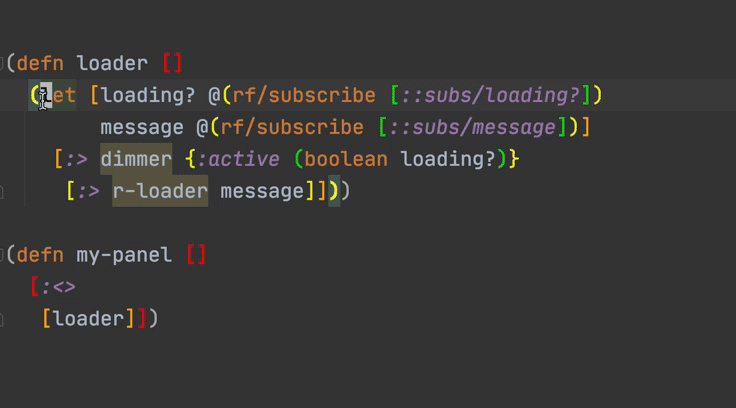Packing peanuts for decoupling Reagent Form-1 components from Re-frame subscriptions
This bit is pretty opinionated, but I dislike using the below structure to define Reagent Form-1 components.
;; Method A
(defn my-component []
(let [... bunch of re-frame subscriptions here ...]
[:div "hiccup stuff"]))The problem with the above example is that functions defined as such become impure, heavily dependent on the Re-frame subscriptions bound in their let-forms - coupling the components and the subscriptions. This makes it harder to create a library of components that you can share between projects, and it makes the components harder to test.
I prefer something like this...
;; Method B
(defn my-component [& {:keys [arg-0 ... arg-n]}]
[:div "hiccup stuff"])In my preferred method (Method B) the subscriptions would happen outside of the components (in a root component/view), and the data would just simply be passed in. The problem with my preferred method is that it can noticeably affect performance when you have nested components - due to Re-frame subscription mumbo-jumbo.
Enter Peanuts. Peanut component macros are intended to wrap components implemented like Method B, turning them into components that behave like Method A. The component will use any args passed in as is or subscribe to them if the args are keywords!
I utilize this simple library at my workplace to great extents, and it has really scratched in an itch for me!
An example of wrapping an existing Form-1 component
It goes without saying that you should have re-frame as a project dependency. You may also need to require it in the namespace(s) you use Peanuts.
There are two ways to use peanut components, fc and defc.
The usage for fc is simple, but it's a little more verbose than its defc counterpart's.
(ns my-ns
(:require [peanuts.core :refer-macros [fc]])
(def a
(fc (fn [& {:keys [a b c]}]
[:div a b c])))The usage for defc is more concise than fc, but may not be as IDE friendly.
(ns my-ns
(:require [peanuts.core :refer-macros [defc]])
;; Usages of 'a' might be syntax highlighted as your IDE may think it's undefined
(defc a
(fn [& {:keys [a b c]}]
[:div a b c]))If you're using Cursive with IntelliJ as your IDE, then you can resolve defc as a def and be a-ok!
See this little blurb if you wish to do that!
Both fc and defc macros accept an optional options map as a final argument.
There may be instances where a component expects certain args to always be keywords and wishes them to be exempt from being used as subscriptions. In such cases, the :exempt option comes in handy.
(defc my-component
(fn [a & {:keys [b c d}]
[:div a b c d])
{:exempt [b c]})In the above example, the values of the b and c parameters will always be exempt from being rebound to subscriptions.
Arguments can also be exempt dynamically by attaching the ^{:exempt true} or ^:exempt metadata.
[my-component ^:exempt :some-key]In the above example, :some-key will be used as a regular keyword and will be exempt.
Sometimes it's nice to only have certain args involved with subs and have the rest be untouched. The :only option is there for such cases.
(defc my-component
(fn [a & {:keys [b c d]}]
[:div a b c d])
{:only [a c]})In the example above, only the a and c args can be rebound to subscriptions.
One thing to note is that the :exempt option always takes precedence over the :only option in odd cases where both
options are defined with conflicting args.
Sometimes one may want to pass additional arguments to their subscriptions. The :sub-args option assists with this use-case.
(defc my-component
(fn [a & {:keys [b c d]}]
[:div a b c])
{:exempt [a]
:sub-args {b [a 1 2 3]}})In the above example, b can be a function or a subscription key. Notice that I'm passing both literals and a reference as args for b. There are a couple caveats to note here.
- If you define a
sub-argkey that is also exempt, then the exemption takes precedence. - There is an order to things when it comes to the
sub-argvalues. For example, if you define asub-arg,a, that uses a component parameter specified later than itself in the function args,b, then the value ofbwill be the original value passed into the component and not the subscribed-value.
Here's an example of caveat #2.
(defc my-component
(fn [a & {:keys [b c d]}]
[:div a b c])
;; here the value of 'b' will be the original value provided to the component in 'a's subscription args
;; and not the value of 'b's subscription
{:sub-args {a [b 1 2 3]}})Below are some examples of using a component that contains sub-args:
(defc my-component
(fn [id selected?]
[:div {:style {:background-color (if selected? :green :white)}}
"✋"])
{:sub-args {selected? [id]}})
;; Use a subscription keyword directly
[my-component 1 ::subs/selected?]
;; Subscribe in a function
[my-component 1 (fn [id] @(rf/subscribe [::subs/selected? id]))]
;; Do w/e you want - you don't need Re-frame! This is especially great for testing components!
[my-component 1 (fn [id] (selected? id))]As the examples in the previous section show-case, args that are specified in the sub-args option - that are functions - will be called. If you want a function to be called without any args passed to it, that's fine too.
(defc my-component
(fn [selected?]
[:div {:style {:background-color (if selected? :green :white)}}
"✋"])
;; Specifying an empty arg-vector will result in a function being called without any args as one might expect
{:sub-args {selected? []}})
[my-component 1 (fn [] @(rf/subscribe [::subs/selected?]))]An alternative way to have function arguments be called (dynamically) is with the sub-fn metadata
as demonstrated below.
(defc my-component
(fn [selected?]
[:div {:style {:background-color (if selected? :green :white)}}
"✋"]))
[my-component 1 ^:sub-fn (fn [] @(rf/subscribe [::subs/selected?]))]If you know that certain function parameters in your component will always be constant values/non-subscribeable keywords, then go ahead and exempt them all using the :exempt option. This will reduce the size of the function that the macros generate.
Furthermore, it won't hurt to tag args you never want to subscribe to with the ^:exempt metadata.
The :only option really comes in handy when wrapping existing components with peanut components.


